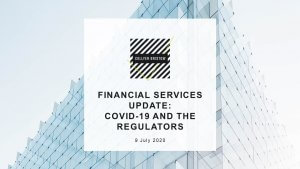- Banking & financial disputes
- Financial services

Longer Reads
Singularis: the Supreme Court upholds the Quincecare duty
3 minute read
Published 6 December 2019
Key information
In a case “bristling with simplicity”, the Supreme Court in Singularis Holdings Ltd v Daiwa Capital Markets Europe Ltd[1] confirmed that financial institutions remain under a duty (the “Quincecare duty”) not to execute a customer’s payment instructions where they are put on inquiry that the instructions are an attempt to misappropriate the customer’s funds even when that the instructions are given by a company’s controlling shareholder or director.
The sole shareholder and dominant director of Singularis (Mr Al Sanea) misappropriated funds from Singularis’ account with Daiwa, an investment bank and brokerage firm. Singularis went into liquidation soon afterwards and a claim was brought by the liquidators against Daiwa for (1) dishonest assistance in Mr Al Sanea’s breach of fiduciary duty in misapplying Singularis’ funds; and (2) breach of its Quincecare duty by giving effect to Mr Al Sanea’s payment instructions.
The claim for dishonest assistance failed at first instance. However, Daiwa was held to have breached its Quincecare duty, subject to a 25% reduction in damages as a result of the contributory negligence of Mr Al Sanea and Singularis’ other directors. The Court of Appeal upheld Rose J’s findings.
The case was appealed to the Supreme Court. The issues on appeal were:
- When can the fraudulent actions of a dominant personality, who owns and controls a company, even though there are other directors, be attributed to the company?
- If the fraudulent actions are attributed to the company, is a claim for breach of the Quincecare duty defeated by:
- illegality;
- lack of causation because the bank’s duty of care does not extend to protecting a company from its own wrongdoing or because the company did not rely on its performance; or
- an equal and countervailing claim in deceit
The Supreme Court unanimously found against Daiwa on all of the above points, dismissing the appeal.
Attribution
Daiwa argued that Mr Al Sanea’s actions should be attributed to Singularis, relying on Stone & Rolls Ltd v Moore Stephens.[2] In that case, the fraud of the company’s director and sole shareholder was attributed to the company, defeating the company’s claim against its auditors for failing to identify the fraud. As the company was deemed to have knowledge of the fraud, it could not bring a claim against the auditors for failing to detect the same fraud.
In determining whether attribution of a fraudulent director’s dishonesty is appropriate, the Supreme Court held that a court should consider the context and the purpose for which the attribution is relevant. The relevant context here was Daiwa’s breach of the Quincecare duty. The purpose of this duty was to protect Singularis against the misappropriation of funds by an agent of the company, such as Mr Al Sanea. To attribute the dishonesty of Mr Al Sanea to Singularis would therefore render the duty meaningless.
Although the appeal failed on attribution, the Court also considered the other defences raised by Daiwa.
Illegality
A claimant cannot bring a claim that arises from the claimant’s own illegal act. Here, Daiwa relied on (1) Mr Al Sanea’s breach of his fiduciary duty in misapplying the funds and (2) Mr Al Sanea’s provision of false documents to Daiwa in support of some of the fraudulent payment instructions.
The Court held that this defence should fail for the following reasons:
- A fiduciary duty is intended to protect companies from the wrongful actions of its directors. The purpose of the duty would be undermined if the company was prevented from recovering the money misappropriated by a director, particularly given that any liability on the part of the company could be dealt with by making a deduction for contributory negligence.
- The Quincecare duty already provides some protection for banks as they are not liable for misappropriated funds unless they have been put on inquiry.
- As a matter of public policy, there is increasing reliance on banks to reduce and uncover financial crime and money laundering. This would be undermined if a financial institution could escape liability for failure to do so by casting the blame on the customer.
Causation / countervailing claim in deceit
Daiwa further argued that the cause of Singularis’ loss was its own fraudulent actions. Daiwa would therefore have an equivalent claim against Singularis in deceit, offsetting Singularis’ claim.
The Court dismissed this argument. It was the fraudulent instruction which gave rise to the Quincecare duty. Daiwa could not by means of the same fraud both incur and escape liability for breach of that duty.
Implications
In this case, it was clear that Daiwa had grounds to believe there was a risk that funds could be misappropriated, but had failed to monitor or manage that risk. This behaviour was all the more unreasonable as Daiwa had a comparatively small number of transactions to monitor compared to, for example, a major clearing bank.
While it remains to be seen what approach the Court will take with a larger institution with many more transactions to monitor, the judgment does provide some general guidance for financial institutions on their duties:
- Not to accept all instructions or documents provided by a client at face value where such documents or instructions seem implausible or are not consistent with the client’s usual behaviour.
- Take additional care when executing instructions from clients which are in financial difficulties or otherwise present a particular risk.
Nevertheless, it is not sufficient for the clients of financial institutions simply to rely on those institutions to take care on their behalf. This gives rise to a risk that any subsequent damages award could be reduced as a result of the client’s own contributory negligence.
Related content
Longer Reads
Singularis: the Supreme Court upholds the Quincecare duty
Published 6 December 2019
Associated sectors / services
Authors
In a case “bristling with simplicity”, the Supreme Court in Singularis Holdings Ltd v Daiwa Capital Markets Europe Ltd[1] confirmed that financial institutions remain under a duty (the “Quincecare duty”) not to execute a customer’s payment instructions where they are put on inquiry that the instructions are an attempt to misappropriate the customer’s funds even when that the instructions are given by a company’s controlling shareholder or director.
The sole shareholder and dominant director of Singularis (Mr Al Sanea) misappropriated funds from Singularis’ account with Daiwa, an investment bank and brokerage firm. Singularis went into liquidation soon afterwards and a claim was brought by the liquidators against Daiwa for (1) dishonest assistance in Mr Al Sanea’s breach of fiduciary duty in misapplying Singularis’ funds; and (2) breach of its Quincecare duty by giving effect to Mr Al Sanea’s payment instructions.
The claim for dishonest assistance failed at first instance. However, Daiwa was held to have breached its Quincecare duty, subject to a 25% reduction in damages as a result of the contributory negligence of Mr Al Sanea and Singularis’ other directors. The Court of Appeal upheld Rose J’s findings.
The case was appealed to the Supreme Court. The issues on appeal were:
- When can the fraudulent actions of a dominant personality, who owns and controls a company, even though there are other directors, be attributed to the company?
- If the fraudulent actions are attributed to the company, is a claim for breach of the Quincecare duty defeated by:
- illegality;
- lack of causation because the bank’s duty of care does not extend to protecting a company from its own wrongdoing or because the company did not rely on its performance; or
- an equal and countervailing claim in deceit
The Supreme Court unanimously found against Daiwa on all of the above points, dismissing the appeal.
Attribution
Daiwa argued that Mr Al Sanea’s actions should be attributed to Singularis, relying on Stone & Rolls Ltd v Moore Stephens.[2] In that case, the fraud of the company’s director and sole shareholder was attributed to the company, defeating the company’s claim against its auditors for failing to identify the fraud. As the company was deemed to have knowledge of the fraud, it could not bring a claim against the auditors for failing to detect the same fraud.
In determining whether attribution of a fraudulent director’s dishonesty is appropriate, the Supreme Court held that a court should consider the context and the purpose for which the attribution is relevant. The relevant context here was Daiwa’s breach of the Quincecare duty. The purpose of this duty was to protect Singularis against the misappropriation of funds by an agent of the company, such as Mr Al Sanea. To attribute the dishonesty of Mr Al Sanea to Singularis would therefore render the duty meaningless.
Although the appeal failed on attribution, the Court also considered the other defences raised by Daiwa.
Illegality
A claimant cannot bring a claim that arises from the claimant’s own illegal act. Here, Daiwa relied on (1) Mr Al Sanea’s breach of his fiduciary duty in misapplying the funds and (2) Mr Al Sanea’s provision of false documents to Daiwa in support of some of the fraudulent payment instructions.
The Court held that this defence should fail for the following reasons:
- A fiduciary duty is intended to protect companies from the wrongful actions of its directors. The purpose of the duty would be undermined if the company was prevented from recovering the money misappropriated by a director, particularly given that any liability on the part of the company could be dealt with by making a deduction for contributory negligence.
- The Quincecare duty already provides some protection for banks as they are not liable for misappropriated funds unless they have been put on inquiry.
- As a matter of public policy, there is increasing reliance on banks to reduce and uncover financial crime and money laundering. This would be undermined if a financial institution could escape liability for failure to do so by casting the blame on the customer.
Causation / countervailing claim in deceit
Daiwa further argued that the cause of Singularis’ loss was its own fraudulent actions. Daiwa would therefore have an equivalent claim against Singularis in deceit, offsetting Singularis’ claim.
The Court dismissed this argument. It was the fraudulent instruction which gave rise to the Quincecare duty. Daiwa could not by means of the same fraud both incur and escape liability for breach of that duty.
Implications
In this case, it was clear that Daiwa had grounds to believe there was a risk that funds could be misappropriated, but had failed to monitor or manage that risk. This behaviour was all the more unreasonable as Daiwa had a comparatively small number of transactions to monitor compared to, for example, a major clearing bank.
While it remains to be seen what approach the Court will take with a larger institution with many more transactions to monitor, the judgment does provide some general guidance for financial institutions on their duties:
- Not to accept all instructions or documents provided by a client at face value where such documents or instructions seem implausible or are not consistent with the client’s usual behaviour.
- Take additional care when executing instructions from clients which are in financial difficulties or otherwise present a particular risk.
Nevertheless, it is not sufficient for the clients of financial institutions simply to rely on those institutions to take care on their behalf. This gives rise to a risk that any subsequent damages award could be reduced as a result of the client’s own contributory negligence.
Associated sectors / services
- Banking & financial disputes
- Financial services
Authors
Need some more information? Make an enquiry below.
Subscribe
Please add your details and your areas of interest below
Article contributors
Robin
HenryPartner - Head of Dispute Resolution Services
Specialising in Banking & financial disputes, Commercial disputes, Corporate recovery, restructuring & insolvency, Financial regulatory and Personal insolvencyHelen
IngramAssociate
Specialising in Commercial, Corporate and Corporate recovery, restructuring & insolvency
Enjoy reading our articles? why not subscribe to notifications so you’ll never miss one?
Subscribe to our articlesMessage us on WhatsApp (calling not available)
Please note that Collyer Bristow provides this service during office hours for general information and enquiries only and that no legal or other professional advice will be provided over the WhatsApp platform. Please also note that if you choose to use this platform your personal data is likely to be processed outside the UK and EEA, including in the US. Appropriate legal or other professional opinion should be taken before taking or omitting to take any action in respect of any specific problem. Collyer Bristow LLP accepts no liability for any loss or damage which may arise from reliance on information provided. All information will be deleted immediately upon completion of a conversation.
Close










































































